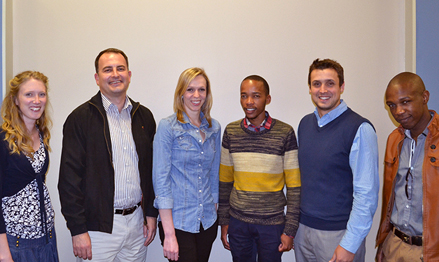Latest News Archive
Please select Category, Year, and then Month to display items
14 June 2024
|
Story Anthony Mthembu
|
Photo Suplied
 Jeremiah Hlahla, a UFS student completing his PhD in Botany at the University of Debrecen as part of an exchange initiative funded by the Erasmus+ Mobility Programme.
Jeremiah Hlahla, a UFS student completing his PhD in Botany at the University of Debrecen as part of an exchange initiative funded by the Erasmus+ Mobility Programme.
As part of an exchange initiative facilitated by the Erasmus+ Mobility Programme, Jeremiah Hlahla, a student at the University of the Free State (UFS), is nearing the completion of his PhD studies at the University of Debrecen in Hungary. Hlahla’s journey, which began in February 2024 and is set to conclude in July 2024, has been a remarkable learning opportunity. “As a first time-traveller to Europe, I have thoroughly enjoyed engaging with people from different countries and cultures,” he said.
The benefits of international collaboration
Hlahla is currently pursuing a PhD in Botany, focusing on plant stress physiology. “My current PhD project investigates the physiological, biochemical and morphological responses of vegetable-type soybean, or edamame, to combined drought and heat stress,’’ he explained. He considers the University of Debrecen the ideal institution to complete his research due to its extensive expertise and resources in similar projects. He noted that his colleagues at Debrecen conduct significant work on plant protection against biotic and abiotic stresses, including salt and drought stress, as well as proteins and amino acids in barley and other legumes.
Given the vast knowledge available on similar projects, Hlahla has found substantial engagement with his work at the University of Debrecen. “Upon arrival, I delivered an introductory lecture presenting my UFS project on the synergistic effects of combined drought and heat stress on the physiology and biochemistry of edamame. It was an engaging session as everyone could relate to my work and asked many questions,’’ he said.
Insights gained from the exchange
Hlahla has also gained valuable lessons that will assist him in his research career, including biotechnology and physiology tools. “I learned how to prepare samples and use high-performance liquid chromatography (HPLC) and reversed-phase ultra-high-performance liquid chromatography (UHPLC) to quantify proteins and amino acids,’’ he said. These techniques are beneficial not only for his current work but will also support future soybean research.
As his experience at the University of Debrecen nears its end, Hlahla reflects on the collaborations and friendships he has formed, which stand out as a significant highlight.
UFS gets support for improving university access and success in South Africa
2013-10-24
|
 |
|
Members of the SASSE Research team are from left: Carike Jordaan, Dr Francois Strydom, Lana Swart, Seisho Gaboutlwelweboutlwelwakemo, Michael Henn en Katleho Nyaile.
Photo: Supplied
24 October 2013 |
The university’s Centre of Teaching and Learning (CTL) received a grant for US$820 000 (about R8 million) from the Kresge Foundation for their South African Survey of Student Engagement (SASSE) research team.
The SASSE research team is committed to furthering student access with success by promoting quality teaching and learning institutionally and promoting collective impact around student success nationally.
Through this three-year project, the SASSE team aims to provide a range of deeply contextualised and globally benchmarked student engagement measures that can be used at institutional and module/course level for the South African context. The data from these measures can be used to improve the quality of undergraduate teaching and learning, and participating institutions will have access to appropriate capacity development interventions to empower them to use the data to promote evidence-based change in their institutions.
Dr Francois Strydom, Academic Director at the CTL, says the lessons from this higher-education project could be used to develop a stronger post-school sector which could help the country to deal with the massive challenge of youth unemployment; thereby promoting equity, social justice and a prosperous democracy in South Africa.
The Kresge Foundation is a private philanthropic foundation in the United States, which is focused on creating opportunity for low-income people through various programmes. This three-year project forms part of the Kresge Foundation’s Education Programme, which focuses on promoting access and success at South African universities. Therefore the SASSE project aims to contribute to the Kresge-sponsored Access and Success in Higher Education in South Africa (ASHESA), to promote a national conversation on improving student success.
In January this year, the university was one of four South African universities selected to take part in a multi-million rand programme to bolster private fund-raising and advancement efforts. For this programme the UFS was granted US$640 000 (about R5,6 million) over a period of five years.